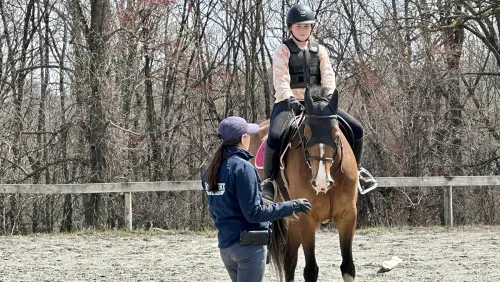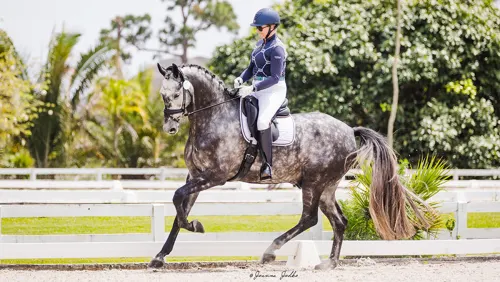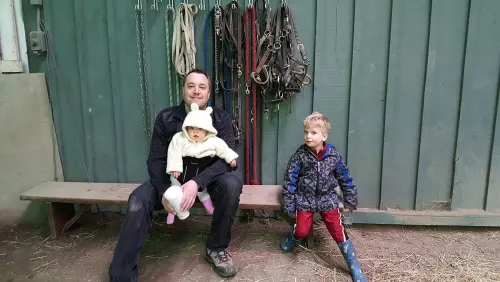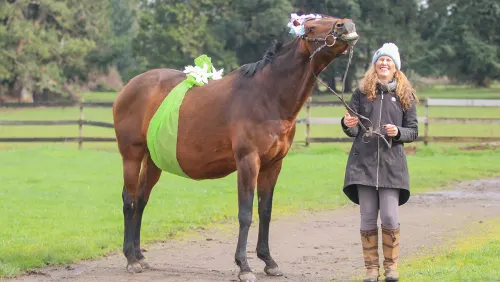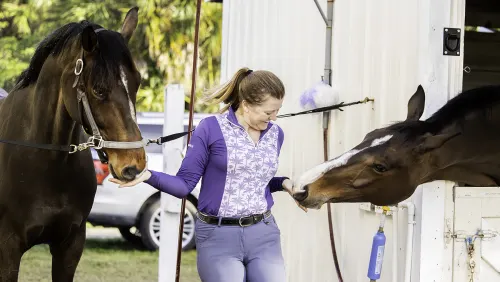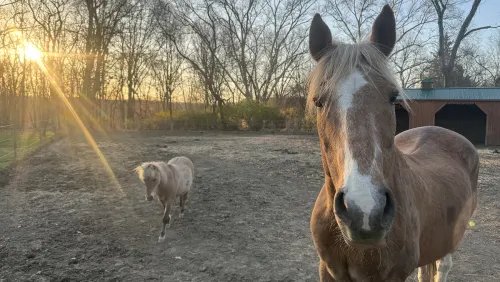Virginia-based trainer Justin Haefner is participating in the Appalachian Trainer Face-Off, a 100-day challenge in which horses taken in by Heart of Phoenix Equine Rescue are paired with trainers to learn new skills and, ultimately, make them better candidates for adoption. Over the next few months, Haefner has agreed to take us along on his training journey with his assigned horse, Scottie.
When I picked up Scottie in Winfield, West Virginia, I had no idea the depth of the project I was about to undertake in the name of giving a feral horse a chance at a safe, productive life.
For the 10 years of his life, Scottie, a little sorrel Quarter Horse, lived on a 50-acre farm in Ohio owned by an elderly man named Kenneth. Despite his love for his horses, Kenneth ran his farm by himself, battled cancer twice, and was the primary caretaker for his wife; his illness and responsibilities inhibited him from getting a chance to ever work with Scottie. Through the years, various people tried training Scottie, but I’ve gotten the impression that these interactions rarely worked out in the horse’s favor.
Two weeks ago, Scottie walked onto my trailer, and we rode for six hours through the green mountains of West Virginia. We unloaded late that night into a round pen in the middle of a field at Westfield Farm in White Post, Virginia, a beautiful facility next to the Virginia State Arboretum. When the sun rose the next morning, Scottie would see endless rolling fields and one of the largest gingko groves in the country.

A very early moment of connection during Justin Haefner’s session with Scottie: “He’s facing me, and we are giving each other our full attention. It feels like an acknowledgment of the long road ahead.” Erin Gilmore Photo
Home for me is, and always has been, the horse country of Northern Virginia. This is now home for Scottie, too, but only for 100 days. In those 100 days, it is my responsibility to give him the education and exposure he needs to return to Winfield to compete in the Appalachian Trainer Face Off and enter the world as a horse who is safe, understanding and content being a partner to some well-intentioned human.
We are one of more than 50 teams—13 of which are in the professional category with me —taking part in this year’s Appalachian Trainer Face Off, a competition run by the Heart of Phoenix Equine Rescue to place some of its rescue horses into good homes and with solid foundations. The mission of Heart of Phoenix is “to save the horses of Appalachia through collaboration, education and the provision of equine resources.”
I first came across Heart of Phoenix and the competition while scrolling through Facebook one evening. I ended up down a deep rabbit hole learning the backstory of Heart of Phoenix; it blew me away to learn of the thousands of horses struggling to survive merely one state away from where I’ve spent my entire life.
ADVERTISEMENT
In the following week, while deciding whether to compete in the Face Off, I made it my mission to tell all of my equestrian peers about the neglected, starving, feral horses in the mountains of West Virginia. Every person I told was as surprised as I had been about this. I knew I needed to participate in this competition, both to grow as a trainer and to advocate for this incredible cause.
The two weeks since Scottie arrived have been full of ups and downs. When I first saw him trotting around the round pen at the Winfield Riding Club, where the competition will be held in August, I messaged my good friend and fellow trainer Colton Woods that Scottie was “so little and cute!” I had no idea the challenge that cute little horse would present.
During my second session with Scottie, I heard Colton say from outside the round pen, “Isn’t he cute?!” as I hobbled around with two tender and freshly rope-burnt hands and a thigh throbbing from Scottie’s very quick and well-placed hind foot.
Since that session, it has become apparent to me that Scottie has had enough exposure to people to manage comfortably until he’s confined. At the point he feels trapped, he will go to any length necessary to feel safe again. He blindly kicks, thrashes and bucks with no regard for what lies in his way.
In general, horses have fight, flight and freeze reactions when threatened. We would think about these states as reactions versus responses to stimuli. When we see a worried horse panic, bolt or kick without warning, for example, I think of these as reactions. They are generally a horse’s instinctive urge toward survival. Responses, on the other hand, typically are quiet and thoughtful, the way of interacting with the world that we are working on throughout a horse’s training.
When a horse feels its safety is compromised, I want to help it shift into a mental and emotional state in which it can evaluate the situation and respond rationally. When Scottie feels threatened, his reactivity is so hard-wired that it’s essentially reflexive: He reacts so rapidly that there is little time in between the stimulus and his reaction. Whether it’s my horsemanship flag coming up to rub his flank, my hand touching his shoulder unexpectedly, or the steady pressure of the cinch once saddled, his immediate reaction is to kick with his hind legs and run.
I think about this in a couple ways: I either can help him understand the stimulus so he doesn’t feel the need to react, or I can help him reframe his go-to reaction so that it’s not as quick to surface. I’ve been going about this through extensive foot handling, and teaching him that I can guide his feet with a rope. This helps him feel less of a need to kick when he’s afraid and is fantastic preparation for the farrier. It has helped tremendously, and I am seeing him think through this process more and more as he is beginning to be able to respond instead of react.
ADVERTISEMENT
In the past few sessions we’ve had together, Scottie seems to have turned a big corner, so I am curious to see how the next week will go. He is getting less violent with his hind legs; he is able to be saddled quietly, and his tendency to lean into my space and pressure is diminishing. His overall attitude toward the work we’re doing together is becoming more pleasant and engaging each day.
This process of changing Scottie’s reaction and feelings about his environment and physical contact is both simple and complex, messy and beautiful. To help a horse see the world in a new way is an honor to say the least.
In Scottie’s case, I don’t feel that he would have much chance to enter society safely without the type of program he’s in. Giving a horse like this a chance at life is what this competition is all about. I am thrilled to see Scottie’s progress in the coming weeks, and I look forward to sharing this journey with all of you.
Justin Haefner is a born and raised Virginia horseman who dedicates his life to helping riders and horses reach their full potential. He specializes in the foundational development of young high-performance horses, and with a background in vaquero-style natural horsemanship, Justin has developed a passion for creating a style that incorporates the teachings of classical dressage and equine bodywork to best understand the psychology and physiology of every horse he trains. In his partnership with his father, Dr. Paul Haefner, Justin runs Riding Far, LLC, which brings together modern psychology and foundational horse development to help horses and riders work through their individual roadblocks to reach their full potential.






